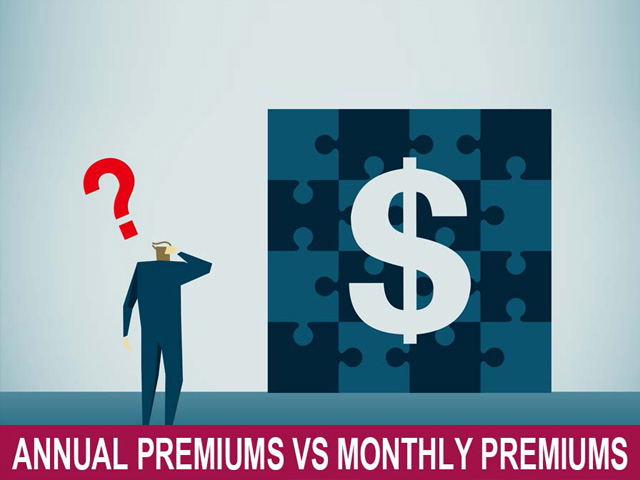As we continue with our Chrisisms series, Chris Unwin outlines why it’s so important to clearly distinguish the meaning of the terms ‘Life Insurance’ and ‘General Insurance’ within the mind of the consumer. …And in another simple comparison, Chris also explores the merits of annual premiums versus monthly premiums…
Life Insurance Vs General Insurance

Do you ever get the feeling that most people tend to lump anything called “insurance” into the one basket? I believe it is absolutely crucial that you establish certain points of differentiation between Life Insurance and General Insurance right from the outset so as to avoid some really damaging misconceptions on the part of your client.
I think you would all agree that the mentioning of the very word “insurance” creates a pretty negative perception in the minds of most of our clients. Indeed some of you will know that this is why I strongly recommend you avoid using the word “insurance” with your clients where possible and replace it with the word “protection”, which doesn’t have the same negative connotation.
However, “Life Insurance” and “General Insurance” are descriptions used by our clients to denote different types of personal protection on the one hand (most commonly life insurance and income protection) and car, household contents and buildings insurance on the other, and despite these two different categories of insurance being poles apart in a number of ways, it is not uncommon for a lot of people to view them both as being all part of the same overall basket called “insurance”.
We need to make sure we educate our clients as early as possible by drawing some very distinct lines in the sand between these two very different types of insurance. I believe that, by drawing our clients’ attention to these points of differentiation, we will also go a long way towards paving the way for a greater understanding and indeed acceptance of the extensive underwriting requirements when applying for “Life Insurance”, thereby pre-empting the objections you might otherwise get in this regard.
The main differentiating feature of “Life Insurance” over “General Insurance” is the concept of guaranteed insurability or non-cancellable cover, a concept that is totally alien to “General Insurance”. With all types of “Life Insurance” i.e. Income Protection, Death Cover, TPD & Trauma Cover, once you have been accepted by the life company, the cover is guaranteed renewable on every policy anniversary for the life of the policy irrespective of any changes in your circumstances. So however unhealthy you may become, however many hazardous activities you may take up in the future, whatever occupation you turn your hand to, and wherever in the world you might decide to visit, you will still be covered.
Compare that with all the different types of “General Insurance”. Every time that you want to renew your cover on the policy anniversary of your car, household contents or buildings insurance policy you are reassessed by the insurer and if you are deemed to be a higher risk now, then your premium will be adjusted accordingly.
No wonder the underwriters of life policies ask so many questions on the way in to the policy, because life underwriters only get one shot at you, whereas general insurance underwriters can move the goalposts every year – spot the difference!
Based on claims experience some might also say that, in the event of claim, life companies will generally bend over backwards to accommodate a claim provided it is within the terms and conditions of the policy, whereas general insurance companies will tend to do everything they can to avoid paying a claim provided it is within the terms and conditions of the policy. However, it is dangerous to generalise in this respect as there will always be instances where the opposite may be true.
I believe educating your clients in this way as early in the conversation as possible will help lower the bar when overcoming any resistance to underwriting requirements as well as helping to get possible alternate terms over the line.
Annual Premiums Vs Monthly Premiums

Do you recommend your clients pay predominantly monthly or annual protection premiums? If the answer is monthly, then you may want to read on if you want to fulfil your “best interest of client” duty and demonstrate value to your clients.
I built an insurance client base in the UK predominantly with monthly premiums and then I built an insurance client base here in Australia predominantly with annual premiums. Let me tell you that, if I was to go to another location to build another client base, I definitely wouldn’t do so predominantly with monthly premiums!
There are a large number of reasons why I believe you should recommend annual protection premiums as the “norm”, both for your clients’ and your own benefit. Firstly let’s have a look at how it benefits your clients to pay their premiums annually.
First and foremost it is approximately 9% cheaper for your clients to pay annually than it is for them to pay monthly. Ironically, therefore, it is those clients who you believe can least afford to pay annually that will benefit the most from paying annually as you are saving them a significant amount of money – ever heard of “best interest of client”?
Secondly, assuming Income Protection is a part of your client’s personal protection package, then it will be more tax efficient for them to pay annually unless the policy is commencing in the month of July, since they will be able to claim the whole year’s premium as a tax deduction in that year (even if it is paid on 30 June) as opposed to just the number of months’ premiums paid in that tax year.
Also, from your client’s perspective, be aware that they are probably expecting premiums to be paid annually, since this is usually the “norm” for other types of insurance they already own e.g. car, home contents and buildings insurance.
Sometimes I think clients are reluctant to pay annually even if they can afford the annual premium day one, as they are under the impression that once they start paying annually, then they are stuck with that payment frequency in future years, so we need to make sure that they realise that, if they can afford to pay the first annual premium up front, then they should do so in the knowledge that they can change this to 6 monthly or monthly if cash flow dictates in future years.
So how are annual premiums more beneficial for you, the adviser?
I remember distinctly in the UK (when I was writing a minimum of 10 policies a month) that the piece of paper I dreaded getting on a monthly basis was the unpaid premium report, as you never knew whether there just weren’t sufficient funds in the client’s account or whether they had gone “neg” on you, but somebody had to follow up all of them – which was a waste of somebody’s time. So the key thought I want to plant in your head is that an annual premium is 11 premiums that can’t get go wrong.
In addition, from a sales point of view, you are much better off starting at the top of the mountain and skiing down if necessary rather than starting at the bottom of the mountain and having nowhere else to go. In other words, if you recommend an annual premium and that proves not to be achievable, then you always have 6 monthly or monthly to fall back on, but if you start by recommending monthly and that proves to be a problem, then where have you got to go? Nowhere!
Let me finally address one issue that I think you may be worrying about. If your client is paying an annual premium, then when they receive their renewal statement, there is a possibility they might hit the panic button because the annual premium due looks a bit on the ‘chunky’ side! You may see this as a downside, but I see it as a great opportunity for you to demonstrate quality service, because you need to make sure you call your clients at anniversary time and point out how great it is that they are getting that CPI increase with no underwriting and make sure they have no cash flow issues with funding the annual premium, and if they do, you can give them the 6 monthly or monthly alternatives!

Chris Unwin is a financial adviser of 37 years standing and has been a specialist risk adviser for the last 22 years. His training and consulting business has operated for 12 years and it specialises in helping advisers across the full spectrum of experience with their client engagement skills, both in the risk advice specific space as well as in the more generic soft skills space.
…And if anyone would like to receive Chris Unwin’s Chrisisms on a fortnightly basis, just email him with your details, including the state in which you reside.
Contact or follow the author: Telephone: +61 417 281 034 | Website | Email | LinkedIn












